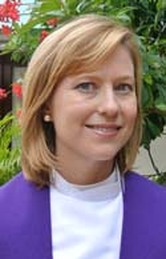 Day 83 – Joshua 16-18, Psalm 70, John 4
Genuine relationships involve open communication. Our relationship with God is no exception. Any concern or question we have, we can express to God in prayer. Yet today’s readings remind us that God often answers in unexpected ways.
In John 4, Jesus meets a woman with many questions: Why would he, a Jewish man, speak with her, a Samaritan woman? (Unacquainted men and woman didn’t just chat in those days, and everyone knew Jews and Samaritans disdained each other.) Did Jesus really think he was better than her ancestor Jacob? And why did Jews insist worship had to be in Jerusalem, anyway?
These inquiries were grounded in serious theological and cultural tensions. When the Israelites were exiled centuries before, some in Samaria remained in the land and intermarried with non-Jews. Samaritans worshiped, not in Jerusalem, but at Mt. Gerizim, the site they believed chosen by Yahweh for the temple. Sharp disagreements ensued.
Jesus listened attentively to the woman at the well. In characteristic fashion, however, he didn’t answer her directly. Instead of dwelling on disputes, Jesus talked about living water, the glorious gift God was offering her that very moment. He acknowledged her past pain and broken relationships. Finally he revealed his perspective: God is doing something new, something greater than these old conflicts. Jesus revealed himself to her as Messiah, and she came to believe in him – which was far more powerful than settling ancestral scores.
In Joshua 17 we hear more questions. Joseph’s descendants ask, “Why do we get only one portion of land when there are so many of us? It’s not equitable.” It was a serious concern. Joshua, the leader appointed by God, offered them the surrounding forests – but they didn’t want that area. The inhabitants there had iron chariots! Again, God had a different view. The tribes of Joseph would inhabit the forest even though it was challenging. “You can overcome the chariots,” Joshua responds, “since there are so many of you.”
God welcomes our questions. But Jesus’ perspective is far greater – and sometimes quite different – from ours. Today let us bring God our questions and listen for the glorious, unexpected answers.
The Rev. Susan Beebe
Priest Associate, St. Gregory's, Boca Raton
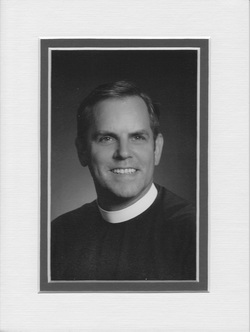 Daily Reflection for March 29 or Day 82
Daily Blog – Day 82, Joshua 13-15,
Psalm 69, John 3
For God will save Zion and rebuild the cities of Judah;
And his servants
shall dwell there and possess it;
The children of his servants shall inherit
it, And those who love his name shall dwell in it. (Psalm 69:35-36)
Call it Zion, the Promised Land, the Garden of Eden, or the Kingdom of God, it is metaphorically where our salvation history delivers us back into intimate communion with our God. This is the common thread that ties our readings together for this 82nd day. It is also Good Friday, and our liturgical observances drive home powerfully that it is faith in the sacrifice of Christ the Lamb of God upon the cross that ushers us into that Kingdom where the eternal gifts of peace, reconciliation, and wholeness are found and experienced.
The assigned three chapters of Joshua begin the stories of the distribution
of the land of Canaan among the tribes of Israel, even though many of these
tribal territories are yet unconquered. The point however with this book is more
theological than historical. It bears witness to Israel’s faith in a God who
intends to establish his kingly rule upon earth by clearly exhibiting his power
and by sharing that power with them through the acceptance of their covenanted
relationship. Faithfulness to God means sharing in kingdom living by having the
land promised to their ancestors.
With John, Chapter 3, we have Nicodemus, a devout Jew and secret
follower. He understood what the Kingdom of God was, but he did not
understand what being "born again" meant, and how that was applicable to
entering into the Kingdom. In typical fashion he responded with an earthly
response. The Kingdom of God was God's promised blessing and salvation to the
Nation of Israel. He was plainly puzzled by being told he could not enter
the Kingdom unless he was "born again." We must understand that Nicodemus as a
good Jew believed that his birth as a Jew assured him a place in the promised
Kingdom. He prided himself in keeping the Old Testament Law and being
morally upright and religious. However, he did not see that entrance into
the Kingdom came by a spiritual rebirth and transformation brought about by
grace through faith in God's promises. He did not understand the concept
of spiritual birth. His response to Jesus shows he had no spiritual
understanding of the things of God. With the last few days of Holy
Week, and especially today, we enter into that profound mystery of God’s
love. We know that within days the New Covenant is sealed by the Blood of
the Lamb with his resurrection victory over sin, evil, and death. We are
transformed again, renewed in our Baptismal promises, and our hearts and lives
again will dance in the joyous presence of God ‘s Kingdom here on earth. I
close with this poem called The Kingdom of God.
Through storm and sun the age draws on
When Heaven and earth shall
meet,
For the Lord has said that glorious
He will make the place of His
feet;
And the grass may die on the summer hills,
The flower fade by the
river,
But our God is the same through endless years,
And His word shall
stand forever.
And they shall meet in love that knows
Nor race nor creed nor
clime,
For the world shall be one brotherhood
In that celestial
time;
And happiness shall be the air,
And righteousness the sod,
And
earth go singing on her way
About the throne of God!
"What of the night?" O Watchman set
To mark dawn's earliest ray:
"The
wind blows fair from the morning star,
Fair from the gates of day;
And
over sorrow and sighing shines
The Dream of Galilee--
The Kingdom of God
that shall fill the earth
As the waters fill the sea."
- Edna
Dean Proctor (1838-1923)
May this Holy Triduum embrace you in the extravagance of God’s grace and
love.
The Very Rev. Dr. William L. Stomski,
Chaplain and Sacred Studies
Educator, Saint Joseph’s Episcopal School, Boynton Beach
Dean of the Diocesan
School for Christian Studies
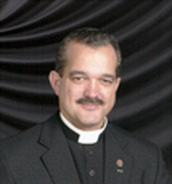 Bible Challenge
Clergy Reflection
Day 81
Joshua 10-12; Psalm 68; John 2
O.K. This one’s really tough. How is someone, namely me, to demonstrate redeeming Grace using today’s readings from Joshua 10-12 and Jesus’ anger- filled, whip assaulting behavior, driving the business dealers from the Temple? If I were a biblical literalist, I would confidently embrace the fact that God was a conquering God, accomplishing Godly purposes, for the Israelites. Indeed, God was for the Joshua writers a violent, murderous, merciless, destroyer of life and property of the “enemies” of Israel. I would further conclude the Divine seed of Righteous anger and judgment didn’t fall far from the Paternal tree. Jesus’ exercise of fury upon the money changers in the Temple would certainly be considered Righteous anger by some. If it was as simple as I being a literalist, my task would be far easier. Alas… I am not…Thanks, Mother Corey, for this Bible challenge.
So, what is your reflection of Joshua 10-12? My offering is, although the “ite” nations may have been historically and violently routed by the Israelites, it was not the loving God of my personal experience who sanctioned the slaughter of those people. When it comes to Jesus clearing the Temple, he had a right to be angered. Which one of us would not be repulsed if our sacred spaces of worship were used for purposes of commerce, other than BINGO?
The core message I bring away from our readings is this… God’s Promise. God promised Abraham and Sarah that He would give to His chosen a land flowing with milk and honey. It would eventually be the land of the “Ite” people: the Hittites, Canaanites, Amorites, Hittites, Perizzites and Jebusites. The redeeming Grace is God was faithful to His promise to fulfill God’s covenant to His people, however it may have historically unfolded.
Let’s explore now the meaning of our covenanting with God… The first story in John’s gospel, Chapter 2, is that of Jesus’ first miracle at a wedding in Cana of Galilee. He did this to demonstrate the great significance of the marriage covenant. After all, the marriage vows are a covenant. Theirs are a sacred promise made between those being married, and God, and our community.
Now think about the covenants God has called you to enter upon, be they religious or secular. In your covenanting, promising, legal contracting, did you see the hand of God moving your choices and decisions? Was the will and purpose of God an integral part of your personal or business preference? Or, were the covenants you made to better your self-driven advancement and success?
Hey, we’re human… Don’t feel bad if your answer was the later… OK, you can feel bad… Please remember, that we’re all on the journey of becoming “Christ- like” as we live into our baptismal covenant. We are not there… But, our loving God calls us forward empowered by the Holy Spirit and Grace to become like His son. A BIG AMEN?
Today is Maundy Thursday. It was the night Jesus was put to the test. His love for his Father God was so perfectly intense that He freely chose to take upon Himself the sin, the pain, the failures, the dehumanization of our thoughts and actions, and all activities of Darkness. No human could bear the pain of the world’s sin that Jesus took upon Himself! He did this to fulfill the ultimate Promise/Covenant of the Father to bring us back to God’s Self. We are now living in the Promise, knowing one day we will be raised to the Joys of Heaven.
My friends, we live in a violent world. I pray your God is not a violent God hell bent on an eye for an eye and a tooth for a tooth... Let us remember, that God sent His son because God loves us so deeply and intimately… This Passion Week, I hope you have encountered our God of Love and Promise, Forgiveness and Healing. This is our God who wants nothing less for His people than the Joy and Peace of His loving Heart.
Blessings for a Holy Week and Joy-filled Easter!
Fr. Bernard J. Pecaro,
St. Martin, Pompano Beach
 Reflection for Day 79, March 26: Joshua 4-6; Psalm 66; Luke 24
An embarrassment of riches is given to us in the final chapter of Luke’s
Gospel. The empty tomb, the myrrh-bearing women, the unbelieving apostles, the road to Emmaus, the “first breakfast,” the great commission, and the Ascension fill 53 verses that have been loved by preachers for centuries! They are stories of God’s triumph, God’s victory..and they fill us with hope and joy. But not so,
I suspect, for those in the stories, or even those first readers of them. Total confusion is probably what they felt. Throughout the chapter, Luke uses a number of words and phrases to show that those involved (and the Early Church) still had difficulty grasping the magnitude of what God was doing in the life, death and resurrection of Jesus. Are we so much different today? The purpose of gospel
writing is to proclaim the message that “Jesus is Lord.” And Luke does it with
eloquence and vivid description. The difficult part is to get beyond Luke’s
phraseology to the heart of his proclamation. Our job is to not simply
appreciate his writing, but to comprehend its meaning—that even though we might
not understand God’s ways, there is a plan, and that plan is made perfect in
Christ.
The psalm and the reading from the Hebrew Scriptures don’t impart the same
sort of confusion or misunderstanding. Confidence in God’s power and faith in
God’s might are woven throughout the story of Joshua and Jericho’s walls,
witnessed not only by the words of the newly ransomed Israelites, but by
the testimony of Rahab as well. And the psalmist who says over and over in
different ways: “How awesome are God’s deeds!”
Let us pray that during this holy season, we may move from a place of
uncertainty and doubt and bewilderment to one of assurance and hope and trust,
that God will lead us toward a faithful future.
The Very Rev. Doug McCaleb is dean of Trinity Cathedral Miami.
 Monday, March 25, 2013 Day 78 – Joshua 1-3, Psalm 65, Luke 23
Spencer Potter
The first part of Psalm 65:5 says "By awesome deeds you answered us with
deliverance." There are two very big moments of deliverance in today's reading, two very big events that are monumental. The first is the Israelites'
crossing over the Jordan. For forty years, the Israelites have been waiting to
enter the promised land, the land of deliverance. Today the waters of the Jordan
part like the sea with Moses, and the Israelites walk into the promised land on
dry ground. It is a big day that has been anticipated for a generation.
The second and infinitely more powerful act of deliverance is Jesus' death on the
Cross. Some churches have stained glass and others have theater seating, but
every church has a Cross. The Cross is a central symbol of the Christian church.
The Cross is at the heart of the Gospel. In Joshua 1:9 the Lord commands Joshua
and thus us to "Be strong and courageous: do not be frightened or dismayed, for
the Lord your God is with you wherever you go." On the Cross, Jesus demonstrates
our cause for taking courage. On the Cross, Jesus demonstrates that God is in
fact with us always. The Cross is the most awesome deed of deliverance. It is
through the cross that we receive forgiveness of sins, communion with God and
the knowledge that God is with us, even in suffering.
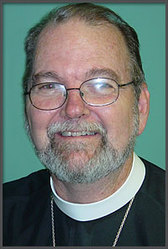 Day 76 – Deuteronomy 34, Psalm 64, Luke 22
On this day, the eve of Palm Sunday, and the most holy week of our year, we read of the end of two preparation journeys [Deuteronomy 34 &Luke 22]. These scriptures mark the end of the story begun in Exodus and the end of the God’s earthly incarnate mission to new and restored life through Jesus’ witness and passion.
I am reminded of Dennis R. Maynard’s imagery of the “Garden” and the “Jungle” as he describes Salvation History in his book “Those Episkopols.” [Chapter 7.] Maynard reminds us that we are created to live in a Garden, to tend it and keep it as paradise. But we struggle and fail and move out of the peaceful confines of the garden into the jungle. Salvation history is a collection of our ‘jungle’ stories and heroes like Moses who attempt to deliver us back. Finally in God’s steadfast love, God comes as God’s-self to offer ultimate deliverance.
In this final chapter of Deuteronomy, and as such the end of the Torah, Moses is taken to the top of Mount Nebo and God shows Moses the whole land. This is the land, “the Garden,” promised to Abraham, Isaac, and Jacob. This is the land of promise to which Moses has delivered the captives of Israel, from their physical and spiritual bondage in the jungles, metaphorically speaking, of Egypt. A long journey of strife, struggle and renewal has spanned 40 years but God says, “There it is, Moses, the Garden lies before you!”
Moses has prepared the people to enter, but his physical presence doesn’t accompany them. The people know God’s word through him but must now take those words and direction to themselves. The Psalmist tell us in our psalm today: “Then everyone will fear, they will tell what God has brought about, and ponder what [God] has done.”
Our Gospel reading today marks the closing days of yet another phase, the final phase, of deliverance of God’s people from the ‘Jungle’ to the ‘Garden.’ More than Moses or any of the prophets, Jesus, God incarnate, shows us what living in the garden is really like. Jesus as the ultimate deliverer, provides us the ultimate model. In the Garden, we live free; we are healed from our infirmities, physical and spiritual; and love our neighbors as ourselves. In the Garden the chains of our past are broken; our parched bodies are refreshed; our blindness is removed and our eyes opened.
As Holy Week approaches, we will liturgically and hopefully in our deepest sense of spiritually, walk this ultimate deliverance path from our own personal ‘Jungles’ to the ‘Garden’ God holds open for us. Unlike Moses who is permitted only to see the Garden, Jesus, though he be removed from our earthly vision, is in the midst of the Garden – Jesus is the Garden!
I pray we can all walk the way of the cross this coming week, climb the mounts of Nebo and Calvary recognizing the ‘Gardens,’ to which God beckons us to return.
The Ven. Thomas A. Bruttell
Archdeacon for Transitional Ministry
Diocese of Southeast Florida
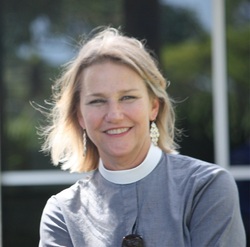 Day 75 The Bible Challenge
Deut 31-33; Psalm 63; Luke 21
We have come so far together as those in the story of God…. Traveled through the ups and downs of the way people can be. We doubted, repented, grumbled and doubted again. The Israelites, like us, made mistakes and then came the time to enter into the Promised Land… that land flowing with milk and honey. But Moses, their holy Moses, would not be going with them. And Moses told the people, told Joshua too, and tells us today, “Be strong and bold. The Lord will be with you. Do not fear or be dismayed. Then Moses gave them a song that was really more like an opera… words of chastising and warning; words of encouragement and passion beseeching God’s people to remember… remember the Lord…those who would carry on the story, our story… And the Lord commissioned their new leader, Joshua. And Moses blessed them all by name, each one.
“In the shadow of your wings I sing for joy… your right hand upholds me.”
Jesus, too, gave Word of warning, prophecy, encouragement to God’s people, those with whom He had always been, that Rock that gave water in the wilderness (1Cor 10:4) and to us today still, across millenia… for Jesus the Christ, too, faced death and loved his people, loves us still.
Give ear, O heavens, and I will speak., let the earth hear the words of my mouth.
May my teaching drop like the rain,
my speech condense like the dew,
like gentle rain on grass,
like showers on new growth.
For I will proclaim the name of the Lord;
ascribe greatness to our God!
The Rock, his work is perfect,
and all his ways are just.
As we prepare for Holy Week, my sisters and brothers in Christ, may our prayer be one of remembering that we are led by a mighty and humble God and may we have the faith to follow in his name.
The Rev. Wendy Tobias
Associate Priest, St. Joseph's, Boynton Beach
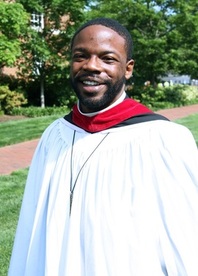 Bible Challenge Day 74 – Luke 20
Fruit Hoarding Only Spoils the Harvest
How does one maintain any balance between institution and belief, in religion?
Especially for us Christians, how do we maintain any balance between the institution and the Gospel? Or further, how can we maintain an efficacious balance between the church as institution and the Church as Body of Christ?
In the Gospel of Luke, chapter 20, we find the parable of the wicked vineyard tenants(vs. 9-19). This passage has always been intriguing to me for what it says about the religious institutions of the day. In describing this passage, the Orthodox Study Bible says this: In this parable, the man represents God the Father, and the vineyard refers to God’s people. The vinedressers are the leaders of the Hews entrusted to care for the people. Each servant sent by the owner stands for an OT prophet who comes to call people back to God, while the beloved son refers to Christ Himself.
In this passage, the vinedressers (or religious leaders) are trying to keep from givingGod any of the fruit of the vineyard. To prevent this, they mistreat the prophets and ultimately cast the only-begotten Son out from their midsts and kill him that they might keep His inheritance for themselves.
What is this fruit that God is sending prophets and His Son to retrieve? This fruit is the blessings of this life. For us as Americans, it might also consist of the blessings accrued through Capitalism, the freedoms of American Democracy. This fruit is our quality of life. And, if political debate can say anything to matters of faith we see how adamantly our Society wants to hoard our various entitlements.
Does our culture (and at times our contemporary/emergent faith) seek to protect this fruit from being harvested by God? Does our contemporary faith reject those servants, sent by God to encourage us to give some of this fruit to God? Have we, in our modern expressions of Christianity, inadvertently rejected the prophets? If we have, then we run the risk of re-Crucifying Christ.
Of course, we will dismiss this out of hand. As the people in the temple responded to Christ, We the People in the Church will likewise undoubtedly say: “Certainly not!” (vs. 16) Yet, the witness of the Holy Scriptures and the reality of Jesus’ Crucifixion confront us and call us to reconsider.
Especially during Great Lent, it is out task to look within and purge ourselves of those internal things that prevent us from yielding to God. When we reject this notion, Christ implores us to “fall on that stone and be broken,” instead of having that stone fall upon us and being ground into powder (vs. 18). We must ask ourselves: are we hoarding God’s fruit? Have we rejected His servants, in order to keep our entitlements? Worse, have we flat-out rejected Christ by our desire to hold on to what we have gained?
May God soften our hearts that we might receive His prophets! May we welcome Jesus into our midst and be converted! May God grant His Church the strength, the courage and the wisdom to prepare the faithful to willingly and lovingly give of their fruits to God!
Fr. Jabriel S. Ballentine is a social commentator and blogger at www.JahBread.com
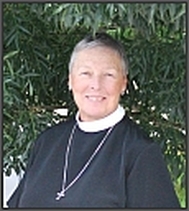 Reflection Day 73
Deuteronomy 25-27; Psalm 61; Luke 1
“So will I always sing the praise of your Name, and day by day I will fulfill my vows.”
--------------- (Psalm 61)
Deuteronomy 26: 16-19 is crystal clear, the Israelite’s covenant with God requires a mutuality of effort between God and His people to bring about the peace and wellbeing of all nations. The gifts of life that God has provided through his beneficence must be recognized for what they are - gifts that have been given to the chosen who must then assume the responsibility for the well-being of others - the Levites, the aliens and the orphans. No wealth hoarding allowed! The 1% must intentionally share with the 99%. Moses lays down the law when he says, “This very day the Lord your God is commanding you to observe these statutes and ordinances…Today you have obtained the Lord’s agreement: to be your God; and for you to walk in his ways, to keep his statutes and his ordinances, and to obey him.” (Deut 26:16-17)
We cannot claim a true stake as God’s chosen people without taking on the role of bringing that God and His gifts to all the people.
The psalmist understands the difficulty of this business of being accountable to God – how challenging it is to keep our hearts and pockets open to others, not hoarding, defiling, and in other ways excluding and harming others through our unfortunate tendency to live a life of selfishness and greed. He writes, “Hear my cry, O God: listen to my prayer. From the end of the earth I call you, when my heart is faint. Lead me to the rock that is higher than I; for you are my refuge a strong, tower against the enemy.” (Psalm 61) How many times a day do we cry out in the same way, correcting a selfish motivation; a harsh word; a nasty piece of gossip? “Please God, let me be better than this,” we pray. “Help me to rise above these feelings of superiority and my need for “more.”
Jesus brings this eternal struggle of self vs. other to a head as he strides into the temple, driving out those who were selling things there. “Get out,” he says. This is a place to honor God, not your pocketbooks. In immediate prelude this bold act, Jesus’ anger mounts and he mourns Jerusalem saying, “If you, even you, had only recognized on this day the things that make for peace! But now they are hidden from your eyes. Indeed the days will come, when your enemies will set up ramparts around you and surround you, and hem you in on every side. They will crush you to the ground, you and your children within you, and they will not leave within you one stone upon another; because you did not recognized the time of your visitation from God. “(Luke 19:41-44)
Harsh words that should bring us to attention and remind us as we enter this first week of Passiontide how through our Lenten journey we must die as well if we are to emerge from the darkness into the light on Easter Day.
The Rev. Deacon Clelia P. Garrity, LCSW; St. Paul’s Episcopal Church, Delray Beach, FL
 As the rector of Saint Joseph's Episcopal Church, I say to you, "Happy Feast Day!" on this our patronal feast. Joseph's journey, both physical and spiritual, echoes the themes that emerge today, especially from the stories in Luke 18. Normally, we hear a parable and then come to an understanding of its meaning. Today, Luke tells us up front what the meaning is: "Jesus told them a parable about their need to pray always and not to lose heart" (Luke 18:1). This two-fold message gives us specific instructions as to my actions (pray always) as well as the attitude that should underlie those actions (not losing heart). Likewise, the story of the Pharisee gives a similar two-fold teaching: yes, it is good that you do all these good things, but equally important is the attitude of dependence on God that should underlie those actions.
Saint Joseph lived his life in responding to God's call when everything within himself and the culture would have told him to do otherwise. He did not lose heart, and God gave him the dream and vision of possibility, and he persevered on his journey with Mary and Jesus. It is when he places himself in dependence on God rather than himself that miracles start to happen. Not unlike the blind man at the end of Luke 18, once we finally cry out in helplessness and dependence on God that He is able to say to us, "Your faith has saved you.”
If you were longing to hear a reflection today on cross-gender dressing, crushed testicles, or the multitude of other things that Deuteronomy 22-24 considers "abhorrent to the Lord," I suggest you fast forward to the second half of the Bible. However, if nothing else, perhaps the attempt of the ancient people of God to try to observe the multitudinous laws put before them will lead us to see the futile nature of trying to earn our salvation. Whenever I try to please God by what I do ("we've given up everything to follow you..."), eventually I reach the breaking point that inevitably comes when I realize I cannot control that with is beyond my control.
T.S. Eliot, in Murder in the Cathedral, puts these words on Thomas Becket's lips: "The last temptation is the greatest treason: to do the right deed for the wrong reason." Luke asks us to ponder our actions today, but just as importantly, the motivating factor for those actions as well. In the long run, what Luke teaches us by parable, and Joseph and Jesus teach us by example, is that our attitude of persistence and humility must underlie the actions on our journey.
A final encouragement is that God is even more persistent than the widow in the parable. He will never stop pursuing justice for us. As Psalm 60 concludes today, "With God we shall do valiantly; it is He who will tread down our foes." Where we may see hopelessness, God sees the vision of new life in each one of us. In the end, we open ourselves up in all that we do and all that we are, to whatever adventures God has in store for us each day. In the words of John Kontol's beautiful song,
To your word, my ears wide open
To your truth, my arms wide open
To your light, my eyes wide open.
To your word, to your truth, to your light, to your love,
O Lord, my heart wide open.
(see and hear this song for St. Joseph's Day at http://www.youtube.com/watch?v=40uUhzXdL1o&feature=youtu.be)
Marty Zlatic
|










 RSS Feed
RSS Feed